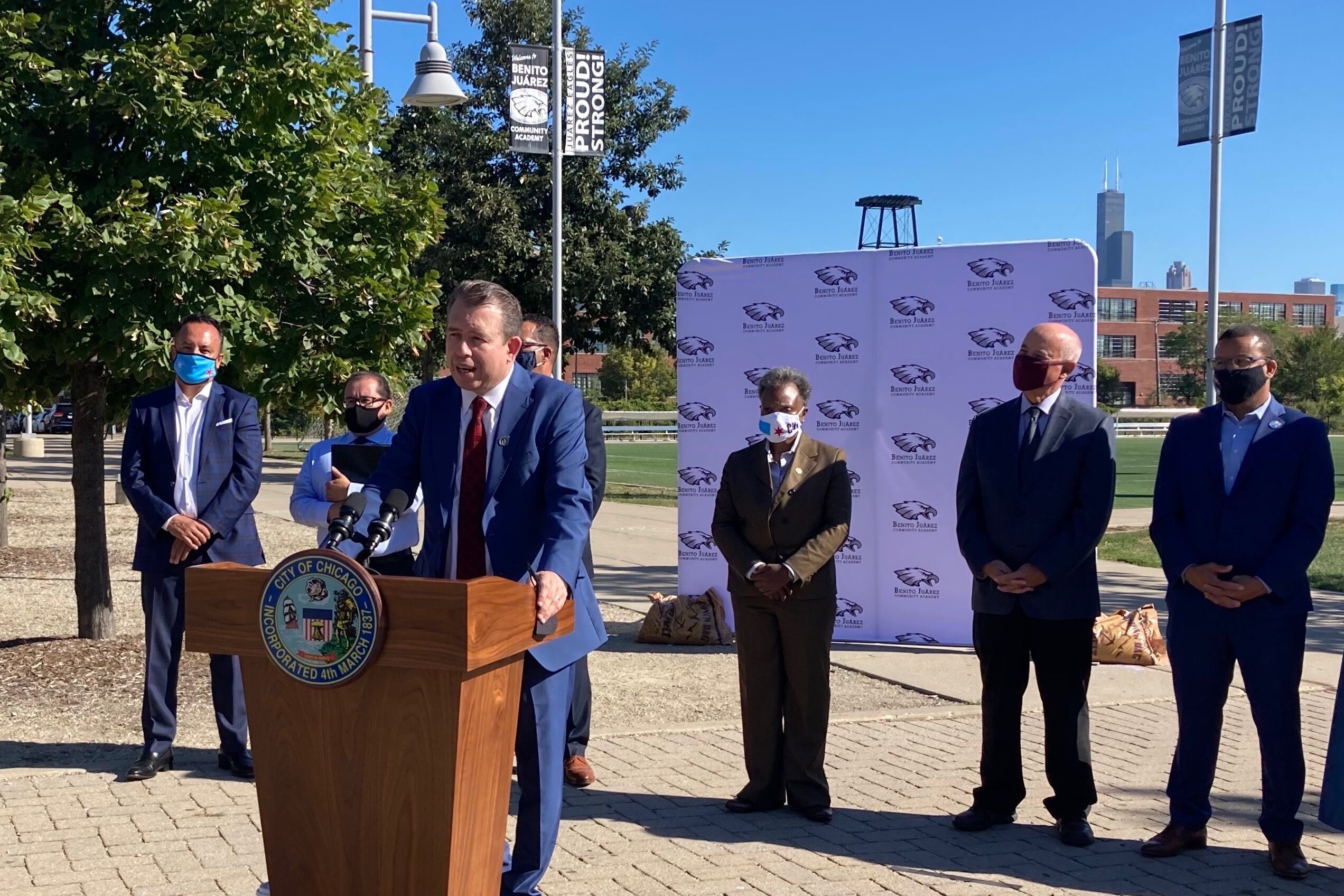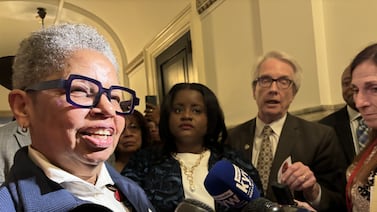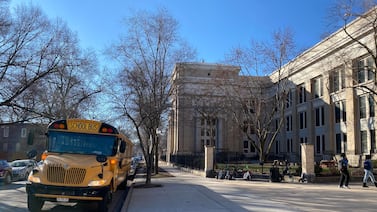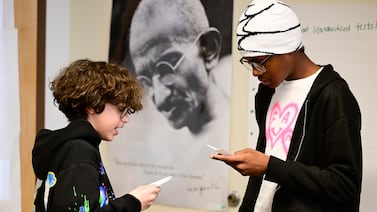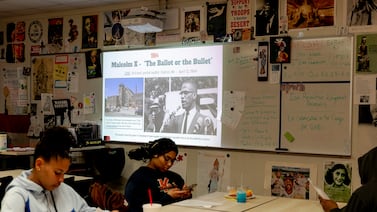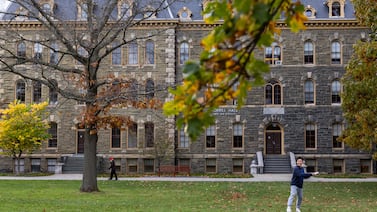Jennifer Baez’s fifth grader started school at Columbus Elementary three weeks ago with a different substitute every day. The teacher was out sick with a non-COVID illness, in the middle of a national shortage of qualified substitutes.
So one day, a security guard taught the class. Another, it was the PE teacher.
The school didn’t communicate anything about the revolving door of adults until two weeks after classes started, Baez said.
To her, that’s a symptom of a larger problem she hopes Pedro Martinez, Chicago’s newly appointed schools CEO, will work immediately to address.
Right now, Baez says, Chicago Public Schools leaders don’t seek input from families or listen to what they say they need. She wants Martinez to change that.
“Don’t just work for us — work with us and listen to us,” said Baez, also the parent of a sophomore at one of the Noble Charter Network’s high schools. “I’ve attended town halls. We ask questions, and they give us no answers.”
What should be on incoming Martinez’s priority list differs according to whom you ask, but in interviews, parents, students, educators, and insiders say he should start with firmer plans around COVID-19 safety, a clearer strategy for addressing the academic and mental health fallout from the pandemic, and a push to tackle deep mistrust in some Black and brown neighborhoods of Chicago.
Some recurring themes also surface: more authentic engagement with families, an action plan for more equitable rollout of programs and resources among schools, and a rapid response to the district’s chronic special education failings.
What do you think should be on Martinez’s priority list in his first 90 days? First year? Share on social media using #WelcometoCPS.
Martinez touched on broad priorities during a press conference last week announcing his appointment — from stepping up the district’s student vaccination efforts to addressing the pandemic’s impact on Black and Latino boys — without getting into details.
His job requires a tricky juggling act: attending to pressing business related to the district’s safety plans and the re-engagement of students on the heels of massive pandemic disruption — while at the same time staying focused on key longer-term challenges, from shoring up graduation rate gains to dealing with declining enrollment.
According to longtime education advocates such as Denise Dyer, a grandparent and co-chair of the Englewood Community Action Council, Martinez must prioritize action on a persistent issue: schools in the city’s poorest areas offering fewer opportunities for children compared to those in wealthier areas of Chicago.
Martinez’s predecessor, Janice Jackson, made inroads in some respects, such as introducing equity grants for struggling schools, expanding high-demand programs such as International Baccalaureate and STEM, and boosting enrollment of Black and Latino students in Advanced Placement classes. But many educators and families still want to see the district do more.
Dyer’s grandchildren, for example, attend multiple South Side elementary schools where no art or music classes are routinely offered. That galls the longtime community leader who is regularly in meetings with North Side parents who talk about the arts offerings their public schools provide.
“How can children even be educated without the arts being introduced at all?” she asked. “My grandkids don’t know anything about music. They don’t even learn songs in school. Our kids are really missing out on that.”
Equity work must be front and center for the next CEO, said Tina Curry, an equity coach at Sarah E. Goode STEM Academy High School.
“All schools should be required to create and implement an equity action plan that includes anti- bias, anti-racist training,” she said. “I would like to see a plan to hire more teachers of color. I would like to see more teachers of color in school leadership roles, teaching AP, and honors classes.”
She said she’d also like to see CPS assess behavior policies that she thinks criminalize students, implement more trauma-informed practices across schools, and partner more aggressively with universities to provide programs and resources.
Clearer plans for mental health and special education
Tynisha Jointer, a former behavioral health specialist in the district who now works as a mental health consultant, said the district needs a more intentional plan for addressing emotional needs of students and educators. “It will not be enough to just dump money on social and emotional learning,” she said.
Leigh Mabry, the mother of a second grader with autism at Beaubien Elementary in Jefferson Park, said she hopes Martinez will put students with special needs high on his priority list. Jackson acknowledged during her final months on the job that she wished she had done more to beef up special education services — and urged her successor to focus on that task.
Martinez needs to attend to a flurry of departures at the Office of Diverse Learner Supports and Services, leading some parents such as Mabry to question the leadership of its chief, Stephanie Jones. Mabry wants the district to bring in autistic adults to offer educators and principals guidance on working with children with autism. After fighting to get her daughter a summer school seat she was initially denied, Mabry also wants the district to ensure principals fully understand the Americans With Disabilities Act.
Mabry is part of a group of parents who organized over the summer to keep their generally unvaccinated children at home as the district returned to mandatory full-time in-person learning. Some of these students were unenrolled from their schools.
Mabry says she hopes Martinez will take a different tack: If the district is unable to offer a remote option to these families under state guidelines, she said schools should offer access to curriculums and other resources until parents are comfortable sending children back.
“Isolating these students will create a whole new problem when they come back,” she said. “Don’t count us out. We are dedicated. We are more checked in than we’ve ever been.”
Tightening up COVID safety protocols
COVID-19 safety plans must be top of mind for Martinez, said Alex Burstein, the co-editor-in-chief of the student newspaper at Chicago’s largest high school, Lane Tech College Prep.
The homecoming dance is coming up, he said, “but we are still waiting on final guidance from the district.” He worries that Lane is leading in close contacts — that is, the number of students who’ve been identified as within six feet of a confirmed COVID case for 15 minutes or more.
“But even with many kids being vaccinated, it’s not clear when you quarantine and when you don’t,” Burstein said.
Missing, too, are clear rules around whether masks are required in the stands at weekly football games, he said, adding that he’d like to see Martinez’s long-term priority list include real recognition and investment in the Local School Council system.
“They should have more of a voice,” said Burstein, who wants councils with persistent vacancies to be given the help they need to fill them.
Jesse Sharkey, the teachers union president, said in an interview that Martinez needs to address missteps in the district’s safety plan rollout — such as delays in rolling out its surveillance testing program and in notifying families and educators about possible COVID exposures — and sign an agreement with the CTU, which he argued would allow for clearer communication.
“The real failure of the district’s plan has been the amount of confusion,” said Sharkey.
Sharkey also brought up Martinez’s lack of experience as a teacher or school leader — a fact that the union has emphasized since he emerged as a finalist — and urged him to listen closely to educators and families.
Since Chicago Mayor Lori Lightfoot announced Martinez’s appointment last week, the head of the San Antonio teachers union has sharply criticized the superintendent’s tenure there, saying he failed to engage with educators and brought a top-down approach to decision-making, including in handing over control of struggling schools to charter operators.
For Martinez to be successful in Chicago, Sharkey said, Lightfoot needs to give her hand-picked CEO greater license to set a course for the district than Sharkey argues his predecessor had.
School board president Miguel del Valle said he was heartened by a strong statement the incoming chief made about promoting vaccines among students and families from Day One.
Del Valle, who believes the district should be offering vaccines at each high school, has previously voiced frustration with slow progress in a district push to vaccinate students 12 and older and their family members.
“There’s nothing more important than dealing with the health of our students and families,” he said. “Vaccinations, vaccinations, vaccinations.”
He also wants Martinez to bring a sense of urgency to fully rolling out a surveillance COVID-19 testing program, now delayed amid logistical hurdles, and expanding its contact tracing team to address notification delays.
Not losing sight of the academic long game
Another urgent to-do item on del Valle’s list: Appointing a permanent second- and third-in-command, and filling other key vacancies in district leadership.
Filling those leadership positions will be a critical next step in helping Chicago’s 341,000 students recover from the pandemic — and in stoking pre-pandemic gains in areas like graduation rates and math and reading (though some improvements have flatlined in recent years).
Board vice president Sendhil Revuluri says Martinez must strike a balance between pressing safety-related business — and academic needs with much longer-term implications. Revuluri said student and employee safety is priority number one, but what can get lost in the discussion of COVID cases and mitigation is that students are returning to campuses this fall with heightened academic needs. Schools and the district as a whole must stay focused on gauging and addressing those needs.
Revuluri, who with fellow board members served on the district’s search committee, said the way Martinez won over parents, educators, and community members on the committee makes him optimistic about the new CEO’s prospects for building trust and community ties.
“Of all the people we saw, everyone on the committee was extremely positive about him,” Revuluri said.
Martinez’s former boss, Arne Duncan, who led Chicago Public Schools from 2001 to 2009 and served as U.S. Secretary of Education under Barack Obama, said even amid this moment of pandemic upheaval, Martinez must stay focused on the long game: graduating kids from high school prepared for college or careers.
“You have to do both what’s urgent and what’s critically important,” Duncan said. “You can’t lose sight of that.”
Duncan says Martinez is the right leader to strike that balance. He said he and Jackson spoke about the possibility of recruiting Martinez back to Chicago shortly after she decided to step down. Martinez has deep knowledge of the district and roots in the city that can help him build trust, Duncan says.
As chief financial officer under Duncan, Martinez managed the district’s budget during a fiscal crunch. Duncan recalls that he was guided by a key question: “What is making a difference for kids?” — for instance, in steering more resources to afterschool and summer programs.
“We agreed he was not just the best person to take the job,” Duncan said. “He was probably the only person.”
For Jose Olivares, a leader on the district’s Student Advisory Council and a senior at John Hancock College Prep on the city’s Southwest Side, witnessing a fellow Mexican-American — the district’s first permanent Latino CEO — land the top job was deeply meaningful.
He applauded Martinez’s comments about promoting COVID vaccination and about the role racism and poverty play in the country’s education system. Now, it’s time to get to work addressing that reality, Olivares said, including issues such as disproportionate discipline for students of color — in close partnership with students.
“I am really proud and happy that a Latino is the new CEO,” Olivares said. “I hope he’s really engaged with students.”


